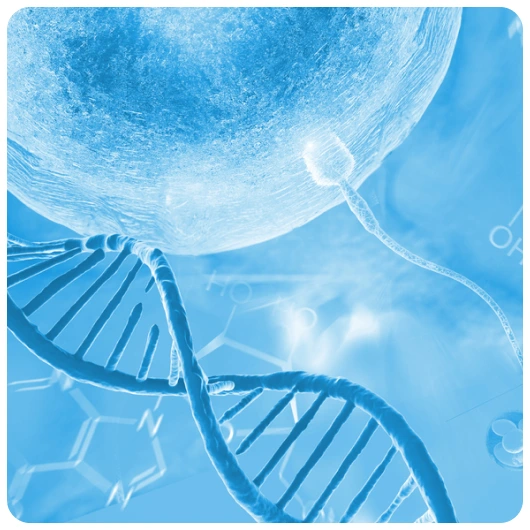Sperm DNA fragmentation refers to damage or breaks in the genetic material within sperm cells. Think of sperm cells as tiny packages carrying the instructions to build a healthy baby, with these instructions housed within the sperm's DNA. While some fragmentation is normal, a high percentage can hinder a sperm's ability to fertilize an egg or lead to miscarriage.
Causes of Sperm DNA Fragmentation
Several factors can contribute to sperm DNA fragmentation:
- Varicocele: A condition where veins in the scrotum enlarge, potentially leading to increased scrotal temperature and DNA damage.
- Infections: Genital tract infections can damage sperm as they mature.
- Environmental Toxins: Exposure to toxins like pesticides and heavy metals may contribute to DNA fragmentation.
- Age: Sperm quality, including DNA integrity, can decline with age.
- Lifestyle:
- Smoking: Damages sperm DNA.
- Excessive Alcohol Consumption: Negatively affects sperm quality.
- Recreational Drugs: Can cause DNA damage in sperm.

Why Choose Medicover Woman and Child Hospitals

0
+ Expert Doctors
0
+ NICU & PICU Support
0
K+ Normal Delivery
0
+ Beds FacilitySperm Quality Testing
Male fertility is just as important as female fertility for achieving a successful pregnancy. Testing sperm quality can provide valuable insights into reproductive health. This section focuses on one specific aspect of sperm quality: DNA fragmentation.
SCSA Testing for DNA Fragmentation
Sperm Chromatin Structure Analysis (SCSA) is a specialized test that assesses the level of DNA fragmentation in sperm. It analyzes the way DNA is packaged within the sperm cell, indicating potential damage. This test can be helpful for couples struggling with infertility or those considering assisted reproductive technologies (ART) like IVF.
The Link Between DNA Fragmentation and Infertility
- Fragmented DNA can make it difficult for sperm to fertilize an egg or for a fertilized egg to develop normally, leading to:
- Difficulty achieving pregnancy
- Increased miscarriage risk
- Issues with implantation during IVF
Treatment for DNA Fragmentation
If your SCSA test reveals high DNA fragmentation, your doctor will work to identify the underlying cause. Treatment may involve:
- Medication: Antibiotics can treat infections, and medications may be prescribed to improve sperm production or decrease scrotal temperature.
- Assisted Reproductive Technologies (ART): Techniques like ICSI (intracytoplasmic sperm injection) can help select sperm with less fragmented DNA for fertilization during IVF.
- Lifestyle changes: Quitting smoking, reducing alcohol intake, and adopting a healthy diet can improve sperm quality.
Understanding Your DNA Fragmentation Results
SCSA results typically express DNA fragmentation as a percentage. A higher percentage indicates more significant damage. A urologist or fertility specialist can interpret your results and discuss their implications for your fertility.
DNA Fragmentation vs. Traditional Sperm Quality Test
A traditional semen analysis evaluates sperm parameters like count, motility, and morphology. While valuable, it doesn't assess DNA integrity. SCSA provides a more detailed picture of sperm health by specifically looking for DNA damage.
By including DNA fragmentation testing in your fertility evaluation, you gain a deeper understanding of your sperm health and can explore treatment options to optimize your chances of achieving a successful pregnancy.
Ready to take control of your health journey?
Book your appointment now and start your path towards wellness today!
Frequently Asked Questions
How does sperm DNA fragmentation affect fertility?
Fragmented DNA can make it difficult for sperm to fertilize an egg or for a fertilized egg to develop normally. This can lead to challenges getting pregnant, increased risk of miscarriage, and issues with implantation during IVF.
Is DNA fragmentation testing included in routine semen analysis?
No, traditional semen analysis doesn't assess DNA integrity. SCSA is a separate test specifically designed to look for DNA damage.
Who should consider getting tested for DNA fragmentation?
Couples struggling with infertility or those considering ART like IVF may benefit from this test. Additionally, men with known risk factors like varicocele or advanced age might also be recommended for testing.
What are the limitations of SCSA testing?
While SCSA is a valuable tool, it doesn't provide a definitive answer on a sperm's ability to fertilize an egg. Other factors can also influence fertilization success. Additionally, SCSA results can vary slightly between different labs.
What are some alternative tests for DNA fragmentation?
Besides SCSA, other tests like TUNEL and COMET may be used to assess DNA fragmentation. Each test has its own advantages and limitations. Discussing the most appropriate test with your doctor is important.